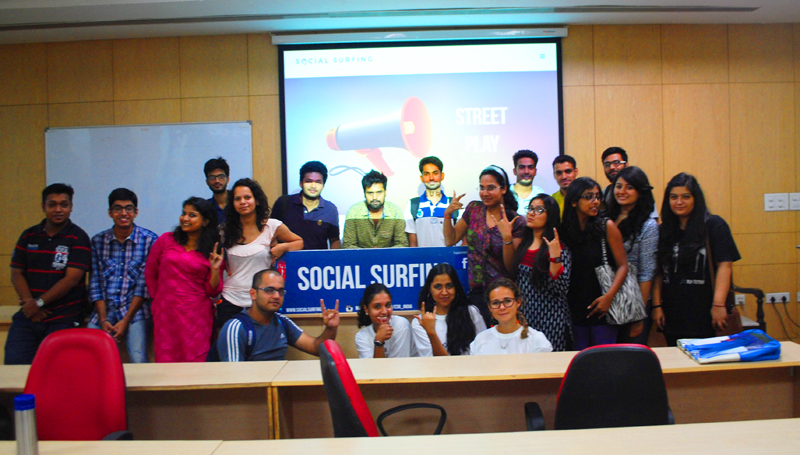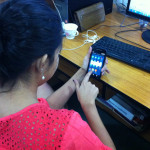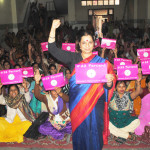It was the sunny afternoon of 15th September, 2015 when our team comprising of Arnika Singh, Vikram Sheoran, Abhiruchi Ranjan and Nikita Blanes headed for Pitampura, to deliver a workshop on Social Surfing to a group of 50 students in the Vivekananda Institute of Professional Studies (VIPS). While our cab approached the glass paneled building of the college, I noticed the stark contrast of the building with the neighboring slums. As we inch closer to the building entrance, I wondered whether the students have noticed this spatial contrast. Two hours into the workshop, and we witnessed an acute awareness of both social issues and social media as one of the students mouthed a “laal salaam”. All we had to do, was to help them see the links between social media as a tool for a social cause closest to their hearts, and our job was done.


The workshop was divided into four sessions. It began with Arnika Singh introducing the team and asking the students questions about their internet usage. Although most students seemed aware about social media, they didn’t seem to know of the usage of social media for social change. Arnika gave the striking example of the security guard at the gate of the college, taking them by surprise. This example was meant to explain how a social cause was about beginning from issues closer home. The students listened with rapt attention and seemed hooked.
The second session was facilitated by Abhiruchi Ranjan, who delivered a presentation on the history of the internet. The presentation was a combination of visuals peppered with interaction with the students. Abhiruchi asked the students about their personal YouTube channels and around five of them discussed their channel content which ranged from cover songs to amateur film videos. The youth were very well informed and creative with their internet usage. The section on social movements like ‘Selfie with the daughter’ and Arab spring was well received and students showed keen interest in them.
The third session was facilitated by Vikram Sheoran who discussed with the students the security features of Facebook. He discussed a wide range of issues from multiple users, password security, language change, personal settings, timeline and tagging settings and log-in options. The students became involved in the presentation. One of them abruptly asked for urgent help for a friend whose Facebook account had been hacked. At this, our team asked the student a couple of questions and advised her to immediately write to facebook regarding this anomaly.
After this, we held the tangram activity with a group of 10 students divided in groups of two teams A and B. One group described the figure and the other attempted to recreate the shape without actually ever looking at the original figure. Our team had to tell the group recurrently to not use hand gestures to explain the figure. At the end of 6 minutes, we found that team B was very close to re-creating the original shape.
After this exercise Arnika explained the concept of counter-speech and the message, “best response to hate speech is better speech” stuck on. The tangram activity helped the students understand the process of dissemination and perception of messages. The activity linked perfectly well with the exercise where the students learnt about how to speak and respond ethically.
Next up, we invited various teams to prepare their own social campaigns and give presentations based on their ideas. Nikita explained the essentials of a social campaign and the key components of designing a good campaign. 4 different teams comprising of roughly 6-7 members came up with their campaigns on different topics. While two of the groups chose to discuss personalized issues like parking space and allotment of classrooms, which involved putting pressure on the management others chose larger social issues like child labour and literacy.
At the end of the workshop we felt that we had as much to gain from the interaction as we had to give. This workshop was a very enriching experience and definitely one that will remain etched in our memory for a while.
Donation for Centre for Social Research to Join our effort in rehabilitating Domestic Violence
Discuss this article on Facebook




